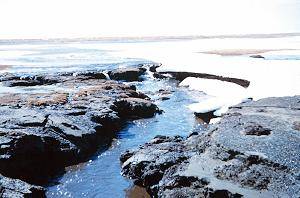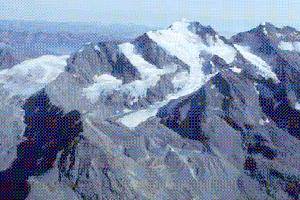 一名荷蘭科學家4日在維也納舉行的「歐洲地球科學聯盟」(EGU)會議上警告,不久的未來將有大量溫室氣體甲烷釋入大氣之中。他表示,全球暖化融解北極凍土層並導致大量甲烷釋出,而這些甲烷將再反過頭來加快暖化效應。另有一些科學家則指出,全球冰川正以前所未有的速度加快融化,而許多海域也開始酸化。
一名荷蘭科學家4日在維也納舉行的「歐洲地球科學聯盟」(EGU)會議上警告,不久的未來將有大量溫室氣體甲烷釋入大氣之中。他表示,全球暖化融解北極凍土層並導致大量甲烷釋出,而這些甲烷將再反過頭來加快暖化效應。另有一些科學家則指出,全球冰川正以前所未有的速度加快融化,而許多海域也開始酸化。
阿姆斯特丹自由大學凡惠斯特丹(Dr. J. van Huissteden)博士表示,甲烷的溫室氣體效應比二氧化碳還強。他解釋說,科學家已開始注意到北極永凍土層所釋放的甲烷,因為這種強力的溫室氣體極可能成為全球氣候暖化效應的正向回饋。
 凡惠斯特丹博士目前正與俄羅斯亞庫特生物學院合作,研究西伯利亞東北部的凍土層。根據他的觀察,北極低地河流的氾濫平原區是主要的甲烷來源,從中釋出的甲烷數量,可能高達非氾濫區凍土沼澤的五倍之多;此外,只要河流流量稍有變動,或者河流一發生氾濫,都容易造成甲烷大量釋出。他表示,當前北極地區的空氣溫度與河流流量都逐漸升高當中。
凡惠斯特丹博士目前正與俄羅斯亞庫特生物學院合作,研究西伯利亞東北部的凍土層。根據他的觀察,北極低地河流的氾濫平原區是主要的甲烷來源,從中釋出的甲烷數量,可能高達非氾濫區凍土沼澤的五倍之多;此外,只要河流流量稍有變動,或者河流一發生氾濫,都容易造成甲烷大量釋出。他表示,當前北極地區的空氣溫度與河流流量都逐漸升高當中。
參與歐洲地球科學聯盟2006年會的冰河學家表示,全球暖化的效應將造成全球各地沿海地區被淹沒,而且甚至有可能在本世紀之內發生。他們在3日表示論文說,格陵蘭與南極西部冰層的融冰速度比以往預測的要快許多,但其中機制則尚未明朗。
位於蘇黎世的「世界冰河觀測局」(WGMC)在會中發表報告指出,歐洲阿爾卑斯山的冰河,將有75%在下個世紀內融化。WGMC的科學家贊普(Michael Zemp)對與會者表示:「從1850年到1970年代之間,阿爾卑斯山冰河的融化速度不過是每十年流失2.9%而已。但現在流失速度卻逐漸加快,從1970到2000年間,流失速度是每十年8.2%,而且多集中在1985年以後發生。」
 阿爾卑斯山冰河扮演著淡水儲存庫的功能,冰河將冬天的降雪儲存起來,而在天氣回暖時慢慢釋出淡水供家庭與農戶使用。冰河消失的話,融雪將在春天來臨時一次傾流而下,造成洪水氾濫,以及夏、秋時期缺水。
阿爾卑斯山冰河扮演著淡水儲存庫的功能,冰河將冬天的降雪儲存起來,而在天氣回暖時慢慢釋出淡水供家庭與農戶使用。冰河消失的話,融雪將在春天來臨時一次傾流而下,造成洪水氾濫,以及夏、秋時期缺水。
另一份在地球科學聯盟2006年會上發表的報告說,二氧化碳排放造成的以往未預期到的效果。發表報告的海洋專家說,本世紀前,大部分海洋的珊瑚將會因海水逐年酸化而遭到侵蝕。尤其是最近才發現到的冷水珊瑚,受到的威脅最烈。
海洋科學家說,人類排放的二氧化碳有三分之一被海洋所吸收,這種海洋化學的變化已造成嚴重的後果。海洋吸收二氧化碳後pH值會降低,意謂著海洋酸化,進而產生海洋化學性質的變化。新研究發現,近10年來深海地區的海洋酸化程度已達到可被測量的程度。
目前大部分研究已注意到海洋酸化造成珊瑚鈣化作用的減緩,以及礁石有機物、某些主要浮游生物群所受到的影響;但對生態系統「脫鈣作用」(decalcification)的發生會造成什麼長遠的效果,則所知甚少。科學家認為,有必要採取更多研究來觀察生態系統對海洋酸化的反應和調整。
美國科羅拉多大學波爾多分校國家大氣研究中心的科學家克雷帕斯(Joan Kleypas)認為,減少二氧化碳排放,似乎就是唯一的解決方式。
Large amounts of the greenhouse gas methane will be released into the atmosphere in the near future, according to a Dutch scientist speaking today at the European Geosciences Union meeting in Vienna. He said global warming could lead to melting of the arctic tundras, setting free large volumes of methane, which would in its turn increase global warming. Other scientists said glaciers are melting at an unprecedented rate and the oceans are turning acidic.
Methane is a much stronger greenhouse gas than carbon dioxide said Dr. J. (Ko) van Huissteden of Vrije Universiteit in Amsterdam. He explained that methane fluxes from the arctic permafrost areas attract scientific attention because the release of this powerful greenhouse gas may act as a positive feedback to climate warming.
Van Huissteden's research in the tundra of northeast Siberian, conducted in cooperation with the Yakut institute of Biology, shows that the floodplains of arctic lowland rivers are major methane sources, where methane fluxes may be five times as high as in non-flooded tundra bogs.
Moreover, he said, these fluxes are very sensitive to river discharge fluctuations and the incidence of river floods. Currently, both air temperature and river discharges are rising significantly in the arctic.
A panel of glaciologists at EGU 2006 said the consequence of global warming may be that, even in this century, coastal areas will be flooded worldwide. The Greenland and West Antarctic Ice Sheets are losing ice at much faster rates than has been predicted, while the mechanisms causing this are not yet fully understood, they said Monday.
Europe's Alps could lose three-quarters of their glaciers to climate change during the coming century, according to new research from Zurich's World Glacier Monitoring Service (WGMC) presented at the meeting. "From 1850 to the 1970s, there is an average loss of 2.9 percent per decade," WGMC's Michael Zemp told EGU participants. But that percentage of loss is accelerating rapidly. "From the 1970s until 2000 it is 8.2 percent per decade, and we see most of that increase since 1985," Zemp said.
Alpine glaciers serve as freshwater reservoirs, storing winter snowfall and releasing it over the warm months for use in homes and on farms. Without the glaciers, snowmelt would run off all at once in the spring, causing flooding and leaving little stored water for summer and fall.
An unexpected effect of increasing emissions of carbon dioxide (CO2) was reported Monday at EGU 2006. A panel of ocean experts said that by the end of this century, corals in large parts of the oceans will see their shells dissolving in sea water that is more and more acidic. Cold water corals, species that have only been recently discovered, appear to be most threatened.
Panel members said that the oceans have so far absorbed about a third of human-caused CO2 emissions, and that this uptake has serious consequences for ocean chemistry. Adding CO2 to seawater reduces the pH level, which is referred to as ocean acidification. New findings indicate that changes in ocean chemistry due to acidification over the last 10 years are measurable even in the deep ocean.
Most research so far focused on the decline in calcification of corals, other reef organisms and some major planktonic groups of the open ocean due to this acidification. But less is known about the long-term effect of decalcification on the ecosystem. Research needs to be done on the ecosystem's response and adaptation to more acid oceans, the scientists said.
According to Joan Kleypas from the National Center for Atmospheric Research, Boulder, Colorado, the only solution seems to be to decrease carbon dioxide emissions.





